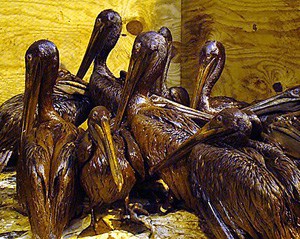
Brown Pelicans captured at Grand Isle, La. on Thursday wait to be cleaned of Gulf spill crude oil. (Photo courtesy of the International Bird Rescue Research Center)
The question of whether government is too big or small is irrelevant. The question is whether government does its job.
Like most Americans, I’ve been captivated by the oil spewing out of the Earth and into the Gulf of Mexico. The cost of this disaster – in human health and life, to Louisiana’s economy, and to the local and global ecosystems – remains unknown. The one thing all experts agree on is that it’s going to be big and bad for everyone.
The spill happens in the context of TEA party rallies, a fragile economic recovery, an expanding national debt, border security concerns, midterm elections, an expanded health care system and two wars – all of which have highlighted two distinct and competing visions of the role of business and federal government in the United States. One side argues that government engagement with the private sector should be severely limited. The other side argues that only through government partnerships can we ensure that there is a safe and fair playing field.
I’ve consistently associated myself with the latter vision – and still do. There are services that governmental agencies, in cooperation with the private sector, can provide that individuals cannot. I can’t build all the roads I take to work or the grocery store or the park. I can’t build and sustain fire stations or hospitals all by myself. I can’t inspect all the meat and produce that ends up on my dinner table. I can’t regulate the oil companies to ensure that the oil and gas that I use in my car is produced safely and with minimum externalized costs.
This oil spill has shown the flaws within both worldviews; neither government nor industry has effectively protected its citizens or its customers. This was true of the financial crisis, and it’s true now of the Deepwater Horizon oil spill.
Who is best positioned?
So, where does that leave us now? Just because government and industry have both failed us in these two situations doesn’t mean that it must always be so. If we are being fair, we can also point to many successes on the part of both institutions. But the question remains: Who is best positioned to make sure that every precaution is taken to avoid these disasters?
Consider this:
• Government is not for profit. As it should, industry streamlines its processes constantly to decrease cost and increase revenue. This drive for constantly improved efficiency can lead to risk-taking (in other contexts we call this being entrepreneurial). Government, on the other hand, is charged with protecting the life, liberty and the pursuit of happiness of its citizens. Simply put, government’s mission more closely aligns with the job that needs doing.
• Public accountability. By definition, our government is accountable to its constituents. We have the opportunity (even if few choose to take advantage of it) to change our elected leaders based on our opinion of their performance. In the private sector, the public has little recourse.
• Redundancy. Many folks bemoan the redundancies they perceive in government, but this is one of the attributes that recommends it as a regulatory body. For example, I am on a Doña Ana search and rescue team, which often is called upon to extract an injured person from a mountainside. To ensure safety, every knot is double-checked by two or more people to make sure that it’s done correctly. Is this fast? No. Is it safe? Yes.
An irrelevant question
To me, it is clear that government is a far better ally in protecting public interests. The question of whether government is too big or too small is irrelevant. The question is whether it does its job. In too many cases it hasn’t done its job. That needs to change because it’s the institution that can best provide the essential services, infrastructure and oversight that allow us to live well.
We face complicated problems as a city, state, nation and world. I hope this blog can serve as a forum for reasonable discussion of our options.
See you next time.
Nick Voges is the blogger behind NMPolitics.net’s Zeitgeist. E-mail him at nick@nmpolitics.net.
